This project was co-designed and implemented in partnership with a parent and a young person with lived experience with the child welfare system.
All of the products in the “Resource” tab were developed with significant input from young people with lived experience in foster care, parents, and caregivers with lived experience with the child welfare system, caseworkers, and data administrators. Their perspectives and experiences were invaluable to identifying gaps in policy and practice and guiding the development of the resources. An infographic describing the methodology and findings for the first phase of this project, entitled Our Identities, Ourselves, can be found here.
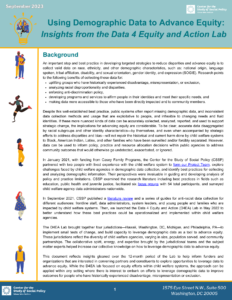
Using Demographic Data to Advance Equity: Insights from the Data 4 Equity and Action Lab
This document reflects insights and lessons learned over the 12-month period of the Data for Equity and Action (D4EA) Lab to help inform funders and organizations that are interested in convening partners and constituents to explore opportunities to leverage demographic data to advance equity.
Download here
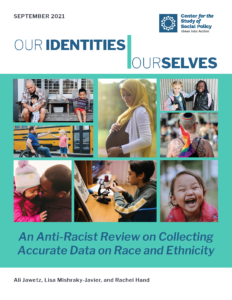
An Anti-Racist Review on Collecting Accurate Data on Race and Ethnicity
This literature review provides a synthesis of the research on best practices for collecting, analyzing and using comprehensive demographic data within child welfare systems.
Download here
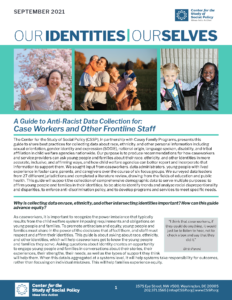
A Guide to Anti-Racist Data Collection for Case Workers and Other Frontline Staff
This guide serves as a tool for case workers and frontline staff in collecting demographic data from young people and families. It includes best practices for data collection, a sample script and a list of questions to engage young people and families in discussions about their identities.
Download here
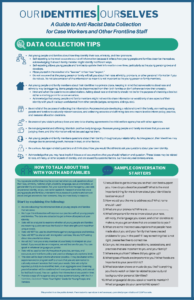 A Poster Guide to Anti-Racist Data Collection for Case Workers and Other Frontline Staff
A Poster Guide to Anti-Racist Data Collection for Case Workers and Other Frontline Staff
This one-page, printable poster provide at-a-glance tips for collecting data, talking with youth and families, and starting conversations, highlighting the most salient information in A Guide to Anti-Racist Data Collection for Case Workers. Note: printable size is 11″ x 17″.
Download here
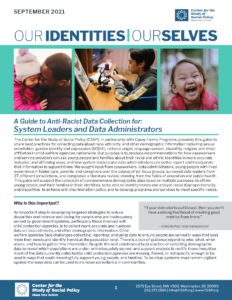 A Guide to Anti-Racist Data Collection for: System Leaders and Data Administrators
A Guide to Anti-Racist Data Collection for: System Leaders and Data Administrators
This guide offers guiding principles and best practices for applying a anti-racist and equity focused lens to data collection, analysis, usage and reporting within child welfare systems.
Download here
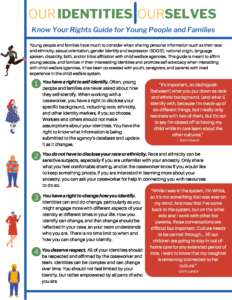
Our Identities, Ourselves: Rights Guide for Young People and Families
This guide serves as a tool for young people and families in understanding their rights when asked questions about their identities. It also includes responses to common questions asked by young people and families related to data collection and usage.
Download here
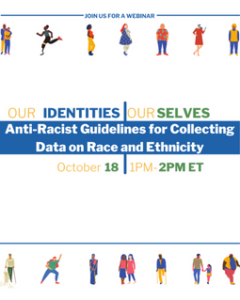
Our Identities, Ourselves: Anti-Racist Guidelines for Collecting Data on Race and Ethnicity—Webinar
In this webinar, learn best practices and tools for centering equity and constituent voice in data collection, analysis, reporting, and use. Topics explored included: the best ways to capture race and ethnicity within data systems; how frontline workers can better ask nonjudgmental questions about young people and families’ identities throughout the life of a case; how system leaders can ensure that data collected is used to advance equity.
Listen here
The Center for the Study of Social Policy, in partnership with Casey Family Programs is launching the Data for Equity and Action (D4EA) Lab to strategize with child welfare jurisdictions about how to collect, analyze and use demographic data to advance equity. In the information we shared:
- An overview of the D4EA Lab;
- benefits of participating;
- application process; and
- logistics.
View the presentation slides here and the recording here.
Over the next 12 months, CSSP will host and facilitate a national peer learning and exchange workgroup focused on leveraging valid and affirming demographic data as a tool to advance equity within child welfare systems. Jurisdictions will meet monthly starting July 2022 through July 2023 and will:
- Grow capacity to collect, analyze, report, and use demographic information (including race, ethnicity, sexual orientation, gender identity and expression, Tribal affiliation, nationality, among other identify markers);
- Connect with peers and experts across the country;
- Build collective knowledge in and skills on how to leverage demographic data to advance equity;
- Engage in curated learning sessions that highlight best practices; and
- Center equity, intersectionality, and anti-racism across strategies.









